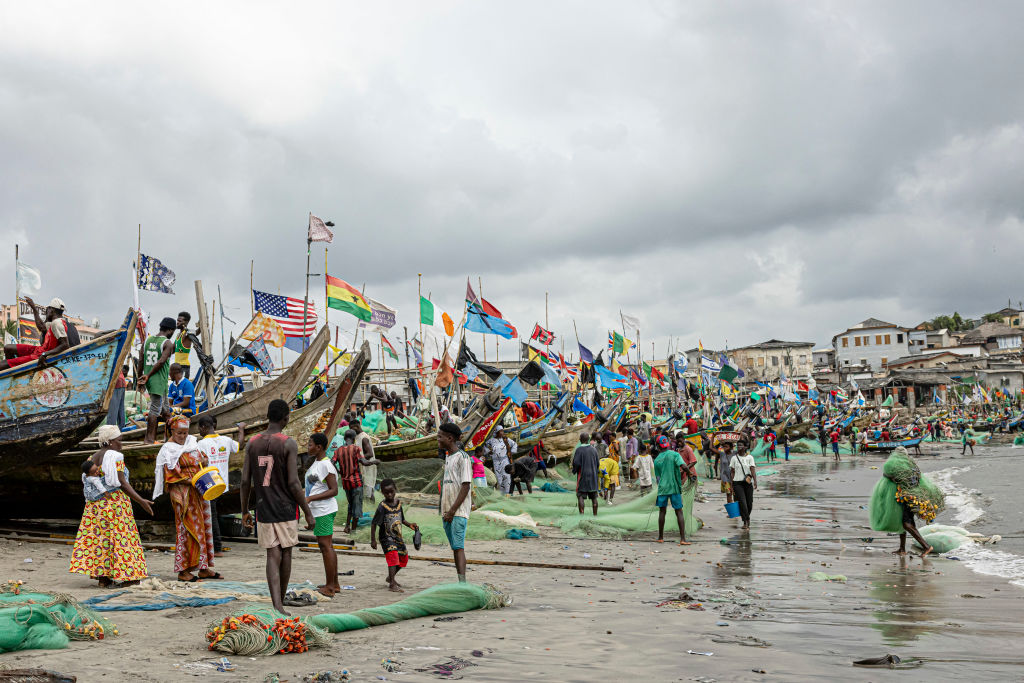Ghana has adopted a new fisheries act aimed at stemming illegal, unreported and unregulated (IUU) fishing. Among other new regulations, the Ghanaian government expanded the country’s inshore exclusion zone (IEZ) from 6 to 12 nautical miles from shore.
Industrial and large-scale vessels are prohibited from fishing in a country’s IEZ, but trawlers from China and other foreign fishing trawlers routinely invade waters meant for Ghana’s artisanal fishermen.
“When the trawlers come close to the area marked solely for our men, they tend to catch a lot of the fish meant for artisanal fishers, and we end up making huge losses,” Regina Solomon, president of the National Fish Processors and Traders Association, told the Environmental Justice Foundation (EJF). “If these fishes had been left for our men to catch, we would have made much more profits buying from them and selling, thereby securing the livelihoods of both our local fishermen and we the fish processors.”
IUU fishing costs Ghana an estimated $14.4 million to $23.7 million annually. Signed into law by President John Mahama on August 19, the act aims to restore stocks of small pelagic fish — such as anchovies, sardines and mackerel, which are near collapse — stimulate the blue economy, and sustain the livelihoods of more than 200,000 artisanal fishermen and 500,000 fish processors and traders.
Addressing ‘Yellow Card’
The new law also is expected to help Ghana shed a 5-year-old European Union (EU) “yellow card” sanction over IUU fishing and address weaknesses in monitoring and enforcement.
“We need to work to immediately get the yellow card lifted, otherwise we risk getting a red card, which means fish from Ghana cannot be exported to the EU market that happens to be the largest market for the fisheries sector,” Emelia Arthur, Ghana’s minister for fisheries and aquaculture, told the Ghanaian newspaper Business and Financial Times.
Exports of tuna contribute nearly $400 million annually to the nation’s economy, Arthur told the Fisheries Committee for the West Central Gulf of Guinea. Lifting the EU warning would restore full market access and demonstrate international recognition of improved fisheries management.
Analysts lauded Ghana’s new law.
“Ghana’s approach could influence other West African nations facing similar challenges with EU trade warnings over fishing practices,” the News Ghana website wrote in an editorial. “Regional coordination may be necessary to address transboundary fishing issues and industrial vessel movements.”
The EJF said that monitoring systems and hefty penalty structures will determine whether the legislation can truly rebuild Ghana’s fisheries.
“This new law marks a turning point for Ghana’s fisheries and coastal communities,” Steve Trent, the EJF’s chief executive officer and founder, said in a statement. “It sends a clear signal of leadership, vision, and commitment to the millions of people who rely on a healthy ocean.”
Beijing’s Bad Actors
Chinese trawlers have pillaged Ghanaian waters for decades, causing the near collapse of some species and driving up prices. China is the world’s worst illegal fishing offender, according to the IUU Fishing Risk Index. In April, Ghana’s Fisheries Commission and Ministry of Fisheries and Aquaculture suspended the fishing licenses of four Chinese trawlers for fishing in restricted areas; harvesting juvenile fish; dumping unwanted fish; and saiko, the unauthorized transshipment of fish at sea.
The Chinese vessels are all flagged to Ghana but are owned by three Chinese companies, the Ghana Business News website reported. Chinese trawlers are notorious for using this practice, known as “flagging in,” in which they abuse local rules to flag a foreign-owned and -operated fishing vessel into an African registry to fish in local waters. Flagging in is a common sign that vessels engage in illegal fishing. According to the EJF, Chinese corporations own at least 90% of the industrial trawlers operating in Ghana.
IUU fishing is often linked to other sea crimes, including human trafficking, drug smuggling and piracy.
Earlier this year, Ghana suspended the fishing licenses of four Chinese vessels. The vessels were accused of saiko – the unauthorized transshipment at sea among other violations. The four vessels include Meng Xin 10, Florence 2, Long Xiang 607 and Long Xiang 608. The fishing ban will last for one year.

